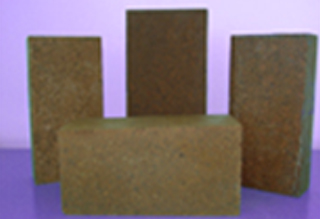There are several types of heat storage bricks for refractory binder magnesium brick manufacturers.
(1) Hydration combination—By means of a hydration reaction between the binder and water at normal temperature to generate a hydration product, the binding occurs. Thermal storage bricks (2) Chemical bonding-by means of a chemical reaction between the bonding agent and the hardening agent, or between the bonding agent and the refractory material at normal temperature, or a chemical reaction during heating to form a compound with a bonding agent effect, resulting in bonding. (3) Polymerization—With the addition of a catalyst or a cross-linking agent, the binding agent undergoes polycondensation to form a network structure to produce binding strength. (4) Ceramic bonding-refers to low-temperature sintering bonding, that is, adding additives or metal powders that can reduce the sintering temperature to the bulk refractory material to greatly reduce the temperature of the liquid phase and promote the solid-liquid reaction at low temperature to produce low temperature Sintering. (5) Adhesive bonding-bonding occurs by means of one of the following physical effects. 1) Physical adsorption: It depends on the intermolecular interaction force-Van der Waals force to generate the binding; 2) Diffusion: under the action of the thermal movement of the substance molecules, the adhesive and the molecules of the adherend interact with each other , Forming a diffusion layer, thereby forming a strong bond; 3) electrostatic effect: there is an electric double layer at the interface between the adhesive and the adherend, and a combination is generated by the electrostatic attraction of the electric double layer. (6) Cohesion and binding-Relying on the addition of a coagulant to cause microparticles (colloid particles) to coagulate and produce binding.
How to classify binders for unshaped refractories?

Divided into organic and inorganic binders according to chemical properties.
Inorganic binders: (1) silicates-calcium silicate cement, water glass, bonded clay, etc. (2) Aluminates-ordinary calcium aluminate cement, pure calcium aluminate cement, barium aluminate cement, etc. (3) Phosphates-phosphoric acid, aluminum dihydrogen phosphate, sodium tripolyphosphate, sodium hexametaphosphate, aluminum chromium phosphates. (4) Sulfates-magnesium sulfate, aluminum sulfate, iron sulfate, etc. (5) Chlorides—magnesium chloride, ferric chloride, polyaluminum chloride, etc. (6) sols—silica sol, aluminum sol, silicon aluminum sol, etc.
Organic binders: (1) Natural organic matter-starch, dextrin, gum arabic, pulp waste, tar, asphalt, sodium bath, etc. (2) Synthetic organic matter-epoxy resin, novolac resin, resole phenolic resin, polystyrene, ethyl silicate, polyurethane resin, etc.
Classified according to the hardening conditions of the binder: (1) hydraulic binders-Portland cement, aluminate cement, etc. (2) Pneumatic rigidity bonding—water glass plus sodium fluorosilicate, phosphoric acid or aluminum dihydrogen phosphate plus magnesium oxide, fine silica powder plus calcium aluminate cement, etc. (3) Thermosetting bonding agent-phosphoric acid, aluminum dihydrogen phosphate, resole phenolic resin, etc.
According to the binding effect at different temperatures, it can be divided into temporary and permanent binding agents.
Temporary binding agents: (1) Water-soluble binding agents-dextrin, powdery carboxymethyl cellulose, powdery and liquid ligninsulfonic acid materials, polyethylene ethanol powder crystals, etc. (2) Water-insoluble binders—hard asphalt, paraffin, polypropylene, etc.
Permanent binder: (1) Carbon binder-tar pitch, phenolic resin, etc. (2) Aluminate cement. (3) Silicate binder—water glass, ethyl silicate, etc. (4) Phosphoric acid and phosphate binder. (5) chloride and sulfate binders.
Address: Steel Industrial Park, Laobian District Industrial Park, Yingkou City, Liaoning Province Consulting Hotline: +86-133-5230-7686 +86-153-0417-8351
Technical Support: Yingkou Zhongchuang Network Technology Co., Ltd. All rights reserved.
Copyright © Yingkou Sensheng Tenai Co., Ltd. All rights reserved record number:Liao ICP No. 19013533-1 Specializing in,Welcome to inquire! Technical Support:Xiangyun platform service support:Yingkou Zhongchuang Network Technology Co., Ltd.